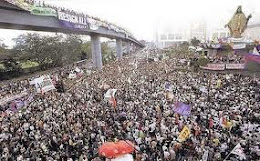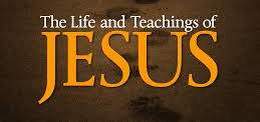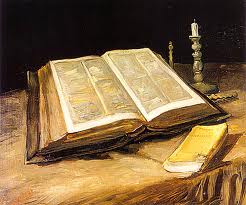From the Vatican Websites
links: http://www.news.va/en/news/pope-benedict-three-days-that-changed-the-worl
Pope Benedict: Three days that changed the world
2011-11-04 Vatican Radio
Joined by the Cardinals and Archbishops of the Curia and the priests and religious of the pontifical household Pope Benedict XVI began by recalling those members of the College of Cardinals who have died this past year: Urbano Navarrete, SJ, Michele Giordano, Varkey Vithayathil C.SS.R., Giovanni Saldarini, Agustín García-Gasco Vicente, Georg Maximilian Sterzinsky, Kazimierz Świątek, Virgilio Noè Aloysius Matthew Ambrozic, Andrzej Maria Deskur.
In his homily Pope Benedict pondered the mystery of death, read in the light of the ‘three days’ that passed between Christ’s death on the Cross, his descent into the ‘abyss of death’ and his resurrection.
He said : “faced with death, we can not but feel the feelings and thoughts dictated by our human condition. And we are always surprised and superseded by a God who is so close to us that He does not even stop before the abyss of death”. He continues “To the every end, Christ takes on our mortal flesh so that it may be invested by the glorious power of God, the breath of the life-giving Spirit who transforms and regenerates. It is the baptism of passion”. “Christ’s death is the source of life, because God has poured all his love into it”.
Below a draft Vatican Radio translation of Pope Benedict XVI’s homily:
Venerable Brothers,
Dear brothers and sisters!
One day after the liturgical commemoration of all the faithful departed, we all gathered around the Lord's altar to offer his Sacrifice for the repose of the Cardinals and Bishops who, over the past year, have ended their earthly pilgrimage. With great affection I remember the venerable members of the College of Cardinals who have left us: Urbano Navarrete, SJ, Michele Giordano, Varkey Vithayathil C.SS.R., Giovanni Saldarini, Agustín García-Gasco Vicente, Georg Maximilian Sterzinsky, Kazimierz Świątek, Virgilio Noè Aloysius Matthew Ambrozic, Andrzej Maria Deskur. Together with them we present to the throne of the Most High the souls of our beloved Brothers in the Episcopate. For one and all we raise our prayer, filled with faith in eternal life and the mystery of the communion of saints. A faith full of hope, enlightened by the Word of God that we have heard.
The passage from the Book of Hosea immediately reminds us of the resurrection of Jesus, the mystery of his death and awakening to immortal life. This passage from Hosea - the first half of Chapter VI - was deeply impressed on the heart and mind of Jesus. In fact, more than once - in the Gospels - He returns to verse 6: " For it is loyalty that I desire, not sacrifice, and knowledge of God rather than burnt offerings". Instead, Jesus does not quote verse 2, but makes it his own and realizes it in His paschal mystery: " He will revive us after two days; on the third day he will raise us up, to live in his presence". In light of this word, the Lord Jesus went to meet his Passion, he embarked on the path towards the Cross, he spoke openly to his disciples of what was to happen in Jerusalem, and the oracle of the prophet Hosea rang true in his own words " The Son of Man is to be handed over to men and they will kill him, and three days after his death he will rise" (Mark 9:31).
The evangelist notes that the disciples "did not understand the saying, and they were afraid to question him" (v. 32). We, too, faced with death, we can not but feel the feelings and thoughts dictated by our human condition. And we are always surprised and superseded by a God who is so close to us that He does not even stop before the abyss of death, which indeed he goes through, remaining in the tomb for two days. But right here the mystery of the "third day" takes place. To the very end, Christ takes on our mortal flesh so that it may be invested by the glorious power of God, the breath of the life-giving Spirit who transforms and regenerates. It is the baptism of passion (cf. Lk 12.50), which Jesus received for us and of which St. Paul writes in Romans. The expression that the apostle uses - "baptized into his death" (Rom 6:3) - never ceases to amaze us, the concision with which he sums up this towering mystery. Christ’s death is the source of life, because God has poured all his love into it, like an immense waterfall, which suggests the image contained in Psalm 41: " Deep calls to deep, in the roar of your torrents, and all your waves and breakers, sweep over me"(v. 8). The abyss of death is filled by the another, even greater abyss, which is God’s love, so that death no longer has any power over Jesus Christ (cf. Rom 8.9), nor over those who through faith and Baptism, are associated with Him: "If we die with Christ - Saint Paul says - we also believe that we shall live with him" (Rom. 8.8). This "living with Jesus" is the fulfillment of the hope prophesied by Hosea: "... and we shall live in His presence" (6.2).
In fact, it is in Christ alone that this hope finds its basis in reality. Before it was in danger of being reduced to an illusion, a symbol derived from the rhythm of the seasons: "like autumn rain, like spring rain" (Hosea 6.3). At the time of the prophet Hosea, the faith of Israel was in risk of contaminating itself with the naturalistic religions of the land of Canaan, but this faith is not able to save anyone from death. Instead, God's intervention in the drama of human history does not obey any natural cycle, it only obeys His grace and faithfulness. The new and eternal life is the fruit of the tree of the Cross, a tree that blooms and bears fruit because of the light and strength that comes from the sun of God. Without the Cross of Christ, all the energy of nature is powerless before the negative force of sin. We needed a force for good greater than the one that governs the cycles of nature, a greater good than that of creation itself: a Love that proceeds from the "heart" of God and that, while it reveals the ultimate meaning of creation, renews and directs it to its original and ultimate destination.
All this happened during those "three days" when the "grain of wheat" fell to earth, remained there for the time needed to fill the measure of justice and mercy of God, and finally produced "much fruit", not remaining alone, but as the firstborn among many brothers (cf. Jn 12.24; Rom 8:29). Now yes, thanks to Christ, thanks to the work accomplished in Him by the Holy Trinity, the images taken from nature are not just symbols, illusory myths, but they speak to us of a reality. At the foundation of hope is the will of the Father and the Son, which we heard in the Gospel of this Liturgy: " Father, they are your gift to me. I wish that where I am they also may be with me" (Jn 17:24) . And among them, whom the Father gave to Jesus, there are also our venerable Brothers, for whom we offer this Eucharist: they "have known" God through Jesus, they knew his name, and the love of the Father and the Son, the Holy Spirit dwelt in them (cf. Jn 12.25-26), opening their lives to heaven, to eternity. Let us thank God for this priceless gift. And, through the intercession of the Blessed Virgin Mary, we pray that this mystery of communion, which filled all their lives, be fully accomplished in each of them.
Vatican Website
links:

















0 comments:
Post a Comment